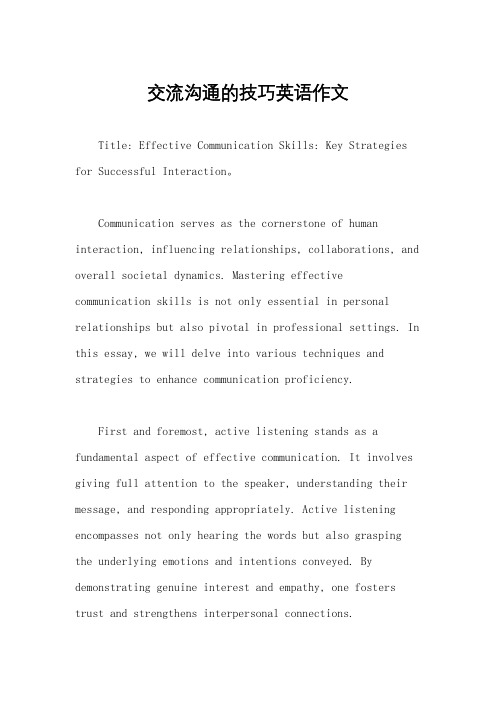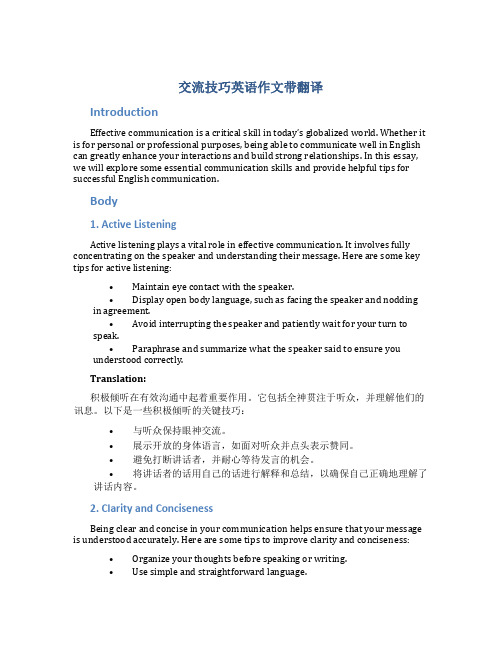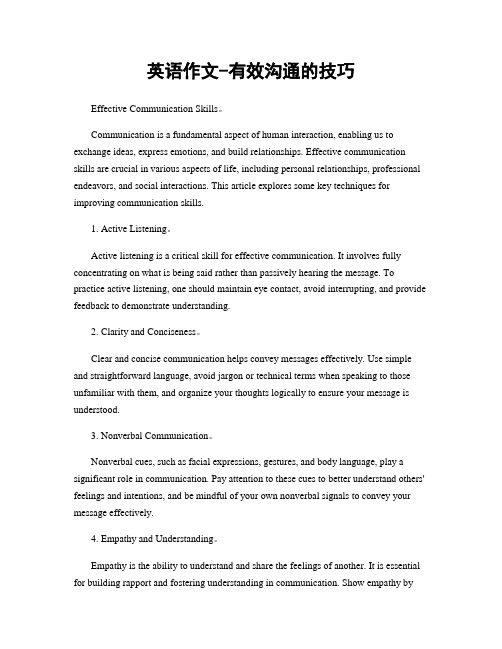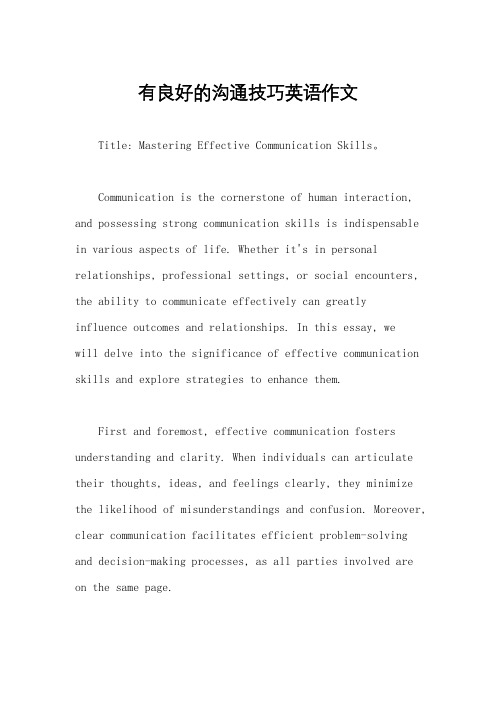基于不同沟通对象风格的沟通小技巧-英文
交流沟通的技巧英语作文

交流沟通的技巧英语作文Title: Effective Communication Skills: Key Strategies for Successful Interaction。
Communication serves as the cornerstone of human interaction, influencing relationships, collaborations, and overall societal dynamics. Mastering effective communication skills is not only essential in personal relationships but also pivotal in professional settings. In this essay, we will delve into various techniques and strategies to enhance communication proficiency.First and foremost, active listening stands as a fundamental aspect of effective communication. It involves giving full attention to the speaker, understanding their message, and responding appropriately. Active listening encompasses not only hearing the words but also grasping the underlying emotions and intentions conveyed. By demonstrating genuine interest and empathy, one fosters trust and strengthens interpersonal connections.Moreover, clarity and conciseness in expression play a pivotal role in effective communication. Communicating ideas succinctly and articulately ensures that the message is easily comprehensible to the recipient. Avoiding jargon and unnecessary complexity prevents misinterpretation and facilitates smoother exchanges. Additionally, organizing thoughts logically and structuring communication in a coherent manner enhances clarity and fosters understanding.Nonverbal communication, often overlooked yet immensely powerful, significantly influences interpersonal dynamics. Body language, facial expressions, gestures, and tone of voice convey subtle cues that complement verbal messages. Being mindful of nonverbal signals and aligning them with verbal communication enhances credibility and reinforces the intended message. Maintaining eye contact, adopting an open posture, and mirroring the body language of the interlocutor establish rapport and facilitate effective communication.Furthermore, empathy and emotional intelligence areindispensable in fostering meaningful connections and resolving conflicts amicably. Understanding others' perspectives, acknowledging their feelings, and responding with empathy cultivates trust and mutual respect. Emotional intelligence enables individuals to navigate interpersonal challenges adeptly, recognize emotional triggers, and regulate their own emotions effectively. By fostering an emotionally supportive environment, one fosters open communication and collaboration.Cultural sensitivity and awareness are imperative in today's interconnected world, where interactions span diverse cultural backgrounds. Recognizing cultural nuances, norms, and communication styles prevents misunderstandings and fosters inclusive dialogue. Embracing diversity and demonstrating respect for cultural differences enriches communication experiences and promotes cross-cultural understanding. Additionally, adapting communication strategies to accommodate cultural diversity demonstrates flexibility and enhances interpersonal effectiveness.Effective communication also entails the skillfulmanagement of conflicts and disagreements. Rather than avoiding or escalating conflicts, addressing them constructively promotes mutual understanding and strengthens relationships. Active listening, empathy, and assertiveness are key in navigating conflictsdiplomatically and reaching mutually satisfactory resolutions. By fostering a collaborative problem-solving approach, conflicts can be transformed into opportunities for growth and reconciliation.Moreover, fostering a culture of constructive feedback facilitates continuous improvement and professional growth. Providing specific, actionable feedback in a supportive manner enables individuals to enhance their performance and refine their communication skills. Conversely, receiving feedback gracefully and utilizing it to self-reflect and adapt fosters personal development and enhances communication proficiency.In conclusion, effective communication skills are indispensable in navigating interpersonal relationships, fostering collaboration, and achieving success in bothpersonal and professional spheres. By cultivating active listening, clarity in expression, nonverbal communication proficiency, empathy, cultural awareness, conflict resolution skills, and a culture of constructive feedback, individuals can elevate their communication effectiveness and cultivate harmonious interactions. As we continue to navigate an increasingly interconnected world, mastering these communication strategies becomes ever more essential in fostering understanding, empathy, and cooperation across diverse contexts and cultures.。
和谁聊天的技巧和方法英文

和谁聊天的技巧和方法英文Tips and Methods for Chatting with Someone in English:1. Start with a friendly greeting: Begin the conversation by saying "Hi" or "Hello" followed by the person's name. For example, "Hi John, how are you today?"2. Show genuine interest: Ask open-ended questions to encourage the person to share more about themselves. For instance, "What do you enjoy doing in your free time?"3. Active listening: Pay attention to what the person is saying and respond appropriately. Use phrases like "That's interesting" or "I understand" to show that you are engaged in the conversation.4. Share experiences: Offer personal anecdotes or stories related to the topic being discussed. This allows for a deeper connection and keeps the conversation flowing.5. Use appropriate humor: Humor can lighten the mood and create a relaxed atmosphere. Use jokes or witty comments when appropriate, but be mindful of cultural differences and ensure that the personunderstands the humor.6. Speak clearly and slowly: Enunciate your words and speak at a pace that is comfortable for the person you are chatting with, especially if they are not a native English speaker.7. Ask for clarification: If you don't understand something the person said, politely ask them to repeat or clarify. It shows that you are interested in understanding their perspective.8. Respect cultural differences: Be mindful of cultural nuances and avoid making assumptions. Ask questions to learn more about the person's background and experiences.9. Be positive and supportive: Encourage the person by giving compliments or expressing empathy. This fosters a positive rapport and makes the conversation enjoyable for both parties.10. Be mindful of time: Respect the person's time and keep the conversation balanced. Avoid dominating the conversation or going off on tangents.Remember, practice makes perfect, so don't be afraid to engage in conversations in English as often as possible.。
交流技巧英语作文带翻译

交流技巧英语作文带翻译IntroductionEffective communication is a critical skill in today’s globalized world. Whether it is for personal or professional purposes, being able to communicate well in English can greatly enhance your interactions and build strong relationships. In this essay, we will explore some essential communication skills and provide helpful tips for successful English communication.Body1. Active ListeningActive listening plays a vital role in effective communication. It involves fully concentrating on the speaker and understanding their message. Here are some key tips for active listening:•Maintain eye contact with the speaker.•Display open body language, such as facing the speaker and nodding in agreement.•Avoid interrupting the speaker and patiently wait for your turn to speak.•Paraphrase and summarize what the speaker said to ensure you understood correctly.Translation:积极倾听在有效沟通中起着重要作用。
交谈技巧英文作文

交谈技巧英文作文1. Well, I think one of the key conversation skills is active listening. You know, really paying attention to what the other person is saying and showing that you're interested in their thoughts and feelings.2. Another important thing is asking open-ended questions. Instead of just asking yes or no questions, try to ask questions that require more than just a one-word answer. It helps to keep the conversation flowing and shows that you're engaged.3. I also believe that being mindful of your body language is crucial. You want to make sure you're maintaining eye contact, nodding, and using appropriate facial expressions to show that you're engaged and receptive to the conversation.4. It's also important to be mindful of your tone of voice. You want to speak clearly and confidently, but alsowith a friendly and approachable tone. It can really make a difference in how the other person perceives you and the conversation.5. And finally, I think it's important to be mindful of the timing and context of the conversation. You don't want to bring up heavy or sensitive topics at inappropriate times, and it's important to be aware of the other person's feelings and emotions before diving into certain subjects.。
关于交流技巧英语作文

关于交流技巧英语作文Communication is an essential skill that plays a vital rolein both personal and professional lives. In this essay, we will explore the importance of communication skills, the various aspects of effective communication, and some tips to improve them.Importance of Communication SkillsEffective communication is crucial for building and maintaining relationships, whether it's with friends, family, or colleagues. It helps in conveying thoughts, ideas, and emotions clearly, which is essential for understanding and collaboration. Good communication skills can also enhanceone's personal and professional growth by facilitating better networking and leadership opportunities.Aspects of Effective Communication1. Listening: Active listening is a key component of communication. It involves not just hearing the words, but understanding the message behind them. This requires paying attention, showing empathy, and providing feedback.2. Speaking: Clear and concise speaking is important. It's not just about what you say, but how you say it. Tone, pitch, and pace can all affect how your message is received.3. Non-Verbal Communication: Body language, facial expressions, and eye contact are all part of non-verbal communication. They can convey confidence, sincerity, and interest, or they can send the opposite message if not managed well.4. Written Communication: Whether it's an email, report, or social media post, written communication should be clear, well-structured, and free of errors. It's also important to tailor your writing style to your audience.Tips to Improve Communication Skills1. Practice Active Listening: Focus on the speaker, avoid interrupting, and show that you are engaged by nodding or using verbal affirmations.2. Expand Your Vocabulary: A rich vocabulary allows for more precise expression and can help avoid misunderstandings.3. Be Aware of Cultural Differences: Understanding cultural nuances can prevent miscommunication and foster better relationships.4. Use Appropriate Body Language: Maintain eye contact, use gestures to emphasize points, and ensure your body language matches your verbal message.5. Seek Feedback: Regularly ask for feedback on your communication style and be open to making adjustments.6. Practice: Like any skill, communication improves with practice. Engage in conversations, join public speaking groups, or take communication workshops.In conclusion, communication is a multifaceted skill that requires continuous learning and refinement. By focusing on the aspects of effective communication and applying the tips provided, one can significantly enhance their ability to communicate in English and in any other language.。
英语作文-有效的沟通技巧

英语作文-有效的沟通技巧Effective Communication Skills。
Effective communication is essential in both personal and professional contexts, enabling individuals to convey ideas clearly, build relationships, and achieve mutual understanding. This article explores key strategies for enhancing communication skills, focusing on clarity, active listening, nonverbal cues, and conflict resolution.Clarity is foundational to effective communication. It involves expressing thoughts in a concise and understandable manner. Using simple language appropriate to the audience ensures that messages are easily comprehended. Avoiding jargon or overly technical terms unless necessary helps prevent confusion and facilitates smoother interactions.Active listening is another crucial skill. It entails not only hearing the words spoken but also understanding the underlying emotions and intentions. To practice active listening, maintain eye contact, nod to show understanding, and refrain from interrupting. Paraphrasing what the speaker has said demonstrates attentiveness and ensures accurate comprehension.Nonverbal cues play a significant role in communication. Facial expressions, gestures, posture, and eye contact convey emotions and attitudes that complement verbal messages. Being mindful of these cues enhances the clarity and impact of one's communication. For instance, maintaining an open posture and nodding occasionally can signal engagement and receptiveness.Conflict resolution is an integral part of effective communication. Conflicts are inevitable in any relationship, but how they are managed determines their impact. A constructive approach involves acknowledging differences respectfully, actively listening to opposing viewpoints, and seeking mutually acceptable solutions. By focusing on shared goals and interests, conflicts can often be resolved amicably, fostering stronger relationships.Moreover, adapting communication style to different situations and audiences enhances effectiveness. For example, formal settings may require more structured and respectful language, whereas informal settings permit a more relaxed approach. Understanding cultural norms and preferences also contributes to successful cross-cultural communication, promoting inclusivity and mutual respect.Furthermore, feedback mechanisms are vital for improving communication skills. Seeking feedback from peers, mentors, or supervisors provides valuable insights into areas for improvement. Being open to constructive criticism and actively working on identified weaknesses cultivates continuous growth and development.In conclusion, mastering effective communication skills is instrumental in achieving personal and professional success. By prioritizing clarity, active listening, awareness of nonverbal cues, conflict resolution, adaptability, and feedback, individuals can cultivate meaningful relationships, foster collaboration, and navigate challenges more effectively. Continuous practice and self-reflection are key to honing these skills, ensuring ongoing improvement and relevance in an increasingly interconnected world.By consistently applying these principles, individuals can build a reputation for clear, respectful, and impactful communication, thereby enhancing their overall effectiveness and influence in various spheres of life.。
英语作文-有效沟通的技巧

英语作文-有效沟通的技巧Effective Communication Skills。
Communication is a fundamental aspect of human interaction, enabling us to exchange ideas, express emotions, and build relationships. Effective communication skills are crucial in various aspects of life, including personal relationships, professional endeavors, and social interactions. This article explores some key techniques for improving communication skills.1. Active Listening。
Active listening is a critical skill for effective communication. It involves fully concentrating on what is being said rather than passively hearing the message. To practice active listening, one should maintain eye contact, avoid interrupting, and provide feedback to demonstrate understanding.2. Clarity and Conciseness。
Clear and concise communication helps convey messages effectively. Use simple and straightforward language, avoid jargon or technical terms when speaking to those unfamiliar with them, and organize your thoughts logically to ensure your message is understood.3. Nonverbal Communication。
有良好的沟通技巧英语作文

有良好的沟通技巧英语作文Title: Mastering Effective Communication Skills。
Communication is the cornerstone of human interaction, and possessing strong communication skills is indispensable in various aspects of life. Whether it's in personal relationships, professional settings, or social encounters, the ability to communicate effectively can greatlyinfluence outcomes and relationships. In this essay, wewill delve into the significance of effective communication skills and explore strategies to enhance them.First and foremost, effective communication fosters understanding and clarity. When individuals can articulate their thoughts, ideas, and feelings clearly, they minimize the likelihood of misunderstandings and confusion. Moreover, clear communication facilitates efficient problem-solving and decision-making processes, as all parties involved are on the same page.Secondly, effective communication strengthens relationships. Whether it's with family members, friends, colleagues, or clients, the ability to communicate openly and empathetically builds trust and rapport. Active listening, a crucial component of effective communication, demonstrates respect and validation for others' perspectives, thereby deepening connections and fostering stronger bonds.Furthermore, effective communication skills are essential in the professional realm. In the workplace, clear and concise communication is vital for conveying instructions, delegating tasks, and collaborating on projects. Moreover, effective communication enhances leadership abilities, as leaders who can articulate their vision and goals inspire and motivate their teams more effectively.So, how can one cultivate and refine their communication skills? Firstly, active listening is paramount. Instead of simply waiting for one's turn to speak, active listeners focus on understanding thespeaker's message fully. This involves maintaining eye contact, nodding in acknowledgment, and paraphrasing or asking clarifying questions to ensure comprehension.Secondly, honing one's verbal communication skills is crucial. This entails speaking clearly, confidently, and concisely. Avoiding jargon and using language that is easily understandable to the audience enhances clarity and prevents miscommunication. Additionally, being mindful of non-verbal cues such as body language, facial expressions, and tone of voice can greatly enhance the effectiveness of verbal communication.Moreover, developing empathy is key to fostering meaningful communication. Empathy involves putting oneself in another's shoes and understanding their thoughts, feelings, and perspectives. By empathizing with others, individuals can communicate more compassionately and forge deeper connections.Another strategy for improving communication skills is practicing assertiveness. Assertive communication involvesexpressing one's thoughts, feelings, and needs confidently and respectfully, without infringing on the rights of others. By assertively communicating boundaries and expectations, individuals can navigate conflicts and assert their needs while maintaining positive relationships.In addition to verbal communication, mastering written communication is also essential, particularly in today's digital age. Whether it's composing professional emails, reports, or social media messages, the ability to convey ideas effectively through writing is indispensable. Clear, concise, and grammatically correct written communication reflects professionalism and enhances credibility.In conclusion, effective communication skills are invaluable assets that contribute to success andfulfillment in various facets of life. By actively listening, honing verbal and non-verbal communication skills, cultivating empathy, practicing assertiveness, and mastering written communication, individuals can enhance their ability to connect, collaborate, and thrive in both personal and professional spheres. Ultimately, masteringeffective communication is a lifelong journey that requires dedication, practice, and a willingness to continually learn and adapt.。
